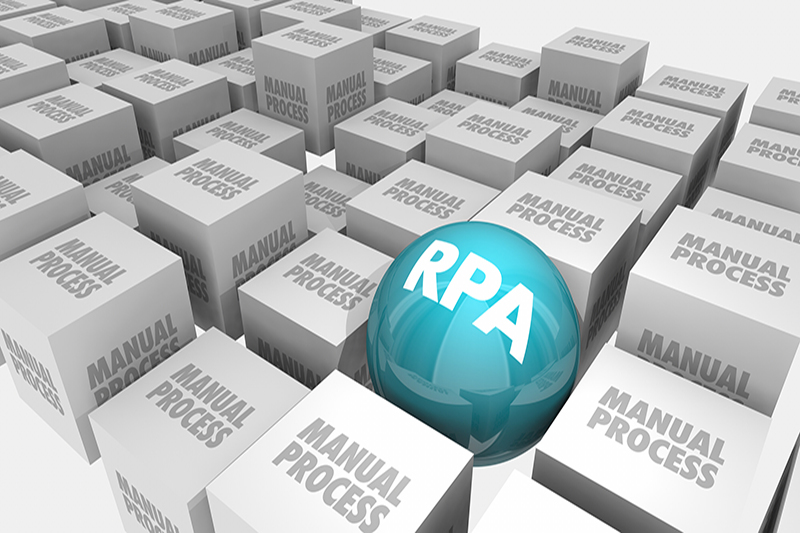Robotic Process Automation (RPA) involves the use of innovative technology to simplify high volume, repetitive tasks and improve workflow. Apps incorporating AI and machine learning that are manufactured by a robotic process automation company can help businesses manage, deploy, and optimize automation to perform a wide array of office tasks. More and more industries are implementing RPA to perform tedious processes. One such industry is accounting and auditing. Accounting is the backbone of an organization. Without proper financial reports, organizations would find it difficult to track their productivity and growth.
RPA simplifies the process of accounting with timely updating which eases the job of in-house employees. It performs various tasks such as auditing financial statements, credit card processing, account opening or closing process, customer onboarding and mortgage lending or loan processing.
The functions of financial firms include Account Payable (AP) and Accounts Receivable (AR). Both these functions involve a lot of repetitive, manual processes. This increases the chance of human errors and losses. In other words, paper-based financial processes are time-consuming and lack efficiency. Robotic Process Automation (RPA) offers the solution. A robotic workforce has the ability to capture and interpret data and generate results accordingly. It automates financial report generation and eliminates errors and inconsistencies.
Let’s take a look at the specific benefits of RPA in accounting and auditing.
Benefits of RPA in Accounting
- Saves Time: By automating and simplifying the tedious accounting processes, RPA saves accountants’ time. They can spend more time focusing on tasks that help in business growth.
- Increases Accuracy: Accounting errors can prove very costly. RPA fill multiple ledgers within a short time by retaining the quality of data with less to no errors.
- Enhances Employee Productivity: As RPA handles data entry, it saves a lot of time and improves employee productivity. They can use their skills for performing critical tasks to serve clients better.
- Data Retrieval: RPA utilizes cloud-based storage. Storing files on the cloud is highly convenient for accountants. By making information retrieval easy, robotics improves the efficiency of the accounting section in any organization.
- Enhances Customer Experience: By automating accounting processes, employees can focus on improving the quality of their work, which in turn, increases customer satisfaction.
- Faster Reconciliation: RPA can integrate tedious activities like multiple worker inputs. The software bots automate the data transfer and resolve inaccurate data, which increases efficiency.
The other benefits of RPA in the accounting and auditing field include:
- Lowers monthly payroll costs
- Faster billing
- Fraud detection capability
- Optimizing final financial report
- Improve tax reporting
- Simplify expense management process
- No work limitation
Implementation of RPA
Accounting and auditing involve many repetitive tasks. RPA automates all activities in this field like data collection, risk management, accounts payable, accounts receivable, and so on. RPA improves and simplifies complicated human work. But if rules cannot be defined, it’s better to leave the task to humans. For RPA to be really effective, it should be used to make processes more efficient so that manpower can be utilized for performing value-added activities. However, when deploying RPA, it must be remembered that even automated processes may make minor errors. Accountants should recheck the data to ensure it has accurate.
RPA Use Cases in Accounting
Robotic Process Automation (RPA) has many use cases in accounting and auditing:
- Accounts payable and receivables
- Inventory management
- Payroll
- Tax
- Preparation of financial reports
- Financial planning
- Forecasting
- Customer onboarding
- Data recording
- Invoice management
- Investment management
- Processing PO
- Vendor contract compliance
The world is going to witness exponential growth of Robotic Process Automation (RPA) in the near future. The COVID-19 pandemic has highlighted the importance of robotics across various industries. Automating accounting can speed up business processes and free workers of tedious manual processes and allow them to focus on handling complex tasks. RPA has simplified data storage and retrieval, increased employee productivity, and eliminated human errors. As it can replace repetitive, rule-based, mundane manual digital tasks with software bots, the demand for RPA will increase in the coming years and lead to improved versions.
Robotic process automation companies are focused on developing innovative applications to meet the needs of various sectors with end-to-end process visualization to make business operations more responsive, accurate and cost effective.




